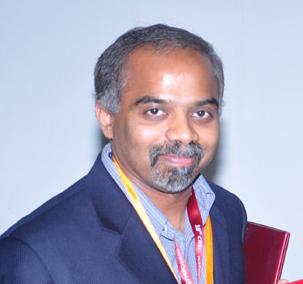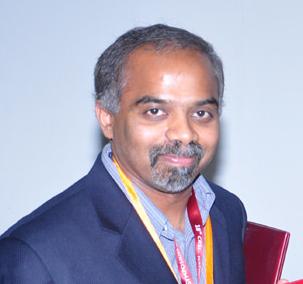
Credit: UMass Amherst
AMHERST, Mass. – University of Massachusetts Amherst chemist Sankaran "Thai" Thayumanavan has received a three-year, $1.8 million grant from the National Science Foundation to create a multi-university Center for Autonomous Chemistry, where he and colleagues, including chemist Vince Rotello, will seek to design artificial self-activating systems, or "automatic control as nature does it," in Thayumanavan's words.
The center will also include one researcher each from partner institutions MIT, the University of Michigan and the University of Illinois at Urbana-Champaign. The Phase 1 funding comes as part of NSF's Center for Chemical Innovation program.
Vice Chancellor for Research and Engagement Michael Malone says, "Autonomous chemistry is a terrific new area for both basic research and ultimately high-impact applications. We are very excited to see Professor Thayumanavan and his excellent collaborators receive this NSF funding."
Thayumanavan says, "We'll be looking to nature for mechanisms and techniques, looking into biomimicry, to try to understand how biological systems accomplish autonomous responses to subtle changes in their environment."
For example, many components of the immune system are quiet and dormant until an irritant or pathogen is detected, he says. "But once that happens, it's activated. It's automatic, organically driven, and that is what we refer to as autonomous. The response requires no other intervention."
Further, "If you look for artificial systems with that kind of capability, you really don't find any. But it would be really valuable if we could develop something like it. We want to figure out the ways nature uses molecular interactions to create autonomous function."
Thayumanavan believes that a broad range of applications exist for autonomous chemistry but at the moment personalized medicine has a high profile and the need is also readily understood.
Peter Reinhart, director of the Institute of Applied Life Sciences at UMass Amherst, which is home to the Center for Personalized Health Monitoring, says, "I am excited that the significant campus investment into cutting-edge core equipment facilities such as nuclear magnetic resonance spectroscopy, mass spectroscopy, electron microscopy and the Nikon Center of Excellence in Light Microscopy are enabling this exciting work on autonomous chemistry."
Thayumanavan points out, "If we had a system that could sense an individual's response to a drug they have been prescribed, for example, that would be very beneficial. We know that some people hyper-react to medication, some respond just fine and some don't respond at all. If we had a quick test, an autonomous biomarker without the need for heavy diagnostic testing, it would enhance medicine for many, many people."
He adds, "We're going to do the chemistry to try to figure out the structural underpinnings of such a system, so we can develop designer materials with such autonomous capabilities," he adds. The chemist says he and team members expect that when they try to mimic any complex biological system using a "one step at a time" approach, each step holds the exciting possibility of leading to new innovations or capabilities.
###
Media Contact
Janet Lathrop
[email protected]
413-545-0444
@umassscience
http://www.umass.edu





